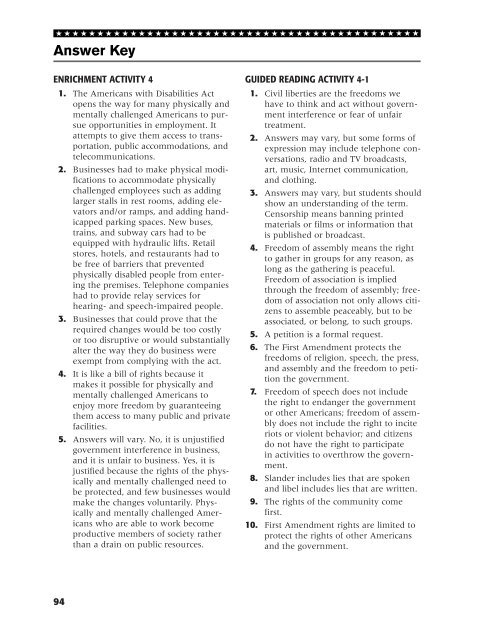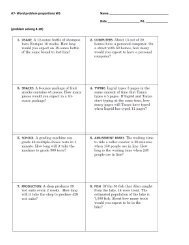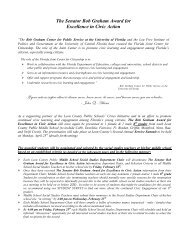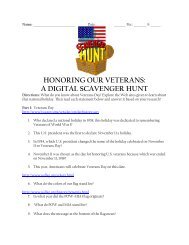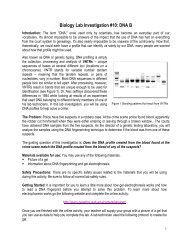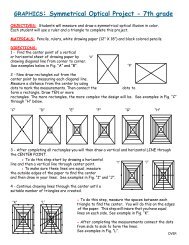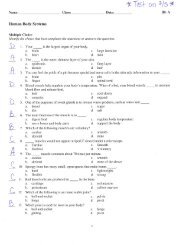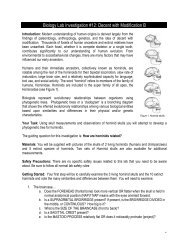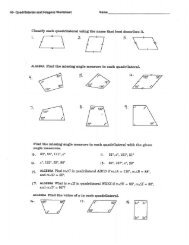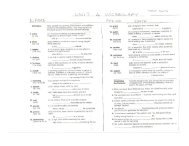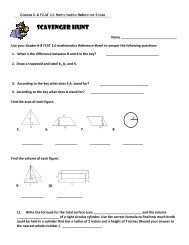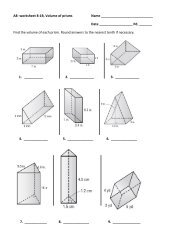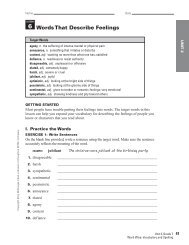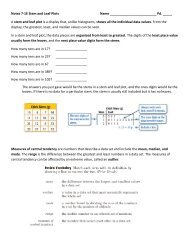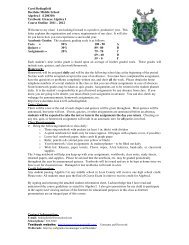Unit 1 Resources: Foundations of American Citizenship - Deerlake ...
Unit 1 Resources: Foundations of American Citizenship - Deerlake ...
Unit 1 Resources: Foundations of American Citizenship - Deerlake ...
You also want an ePaper? Increase the reach of your titles
YUMPU automatically turns print PDFs into web optimized ePapers that Google loves.
Answer KeyENRICHMENT ACTIVITY 41. The <strong>American</strong>s with Disabilities Actopens the way for many physically andmentally challenged <strong>American</strong>s to pursueopportunities in employment. Itattempts to give them access to transportation,public accommodations, andtelecommunications.2. Businesses had to make physical modificationsto accommodate physicallychallenged employees such as addinglarger stalls in rest rooms, adding elevatorsand/or ramps, and adding handicappedparking spaces. New buses,trains, and subway cars had to beequipped with hydraulic lifts. Retailstores, hotels, and restaurants had tobe free <strong>of</strong> barriers that preventedphysically disabled people from enteringthe premises. Telephone companieshad to provide relay services forhearing- and speech-impaired people.3. Businesses that could prove that therequired changes would be too costlyor too disruptive or would substantiallyalter the way they do business wereexempt from complying with the act.4. It is like a bill <strong>of</strong> rights because itmakes it possible for physically andmentally challenged <strong>American</strong>s toenjoy more freedom by guaranteeingthem access to many public and privatefacilities.5. Answers will vary. No, it is unjustifiedgovernment interference in business,and it is unfair to business. Yes, it isjustified because the rights <strong>of</strong> the physicallyand mentally challenged need tobe protected, and few businesses wouldmake the changes voluntarily. Physicallyand mentally challenged <strong>American</strong>swho are able to work becomeproductive members <strong>of</strong> society ratherthan a drain on public resources.GUIDED READING ACTIVITY 4-11. Civil liberties are the freedoms wehave to think and act without governmentinterference or fear <strong>of</strong> unfairtreatment.2. Answers may vary, but some forms <strong>of</strong>expression may include telephone conversations,radio and TV broadcasts,art, music, Internet communication,and clothing.3. Answers may vary, but students shouldshow an understanding <strong>of</strong> the term.Censorship means banning printedmaterials or films or information thatis published or broadcast.4. Freedom <strong>of</strong> assembly means the rightto gather in groups for any reason, aslong as the gathering is peaceful.Freedom <strong>of</strong> association is impliedthrough the freedom <strong>of</strong> assembly; freedom<strong>of</strong> association not only allows citizensto assemble peaceably, but to beassociated, or belong, to such groups.5. A petition is a formal request.6. The First Amendment protects thefreedoms <strong>of</strong> religion, speech, the press,and assembly and the freedom to petitionthe government.7. Freedom <strong>of</strong> speech does not includethe right to endanger the governmentor other <strong>American</strong>s; freedom <strong>of</strong> assemblydoes not include the right to inciteriots or violent behavior; and citizensdo not have the right to participatein activities to overthrow the government.8. Slander includes lies that are spokenand libel includes lies that are written.9. The rights <strong>of</strong> the community comefirst.10. First Amendment rights are limited toprotect the rights <strong>of</strong> other <strong>American</strong>sand the government.94


